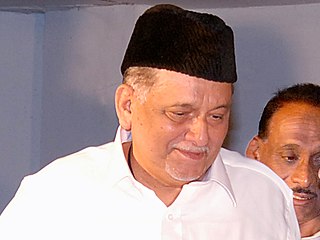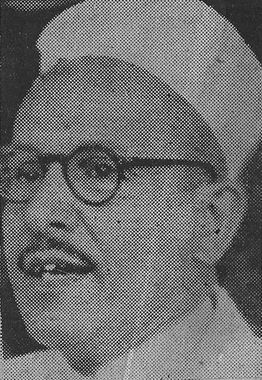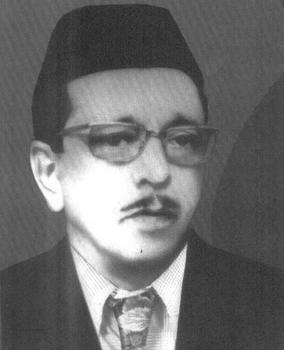
Mappila Muslim, generally in recent times, is a member of the Muslim community of same name found predominantly in Kerala and Lakshadweep Islands in Southern India, and historically used to identify Muslims from Northern Kerala. Muslims of Kerala make up 26.56% of the population of the state (2011), and as a religious group they are the second largest group after Hindus (54.73%). Mappilas share the common language of Malayalam with the other religious communities of Kerala.
Mappila songs are a folklore Muslim song genre rendered to lyrics, within a melodic framework (Ishal), in Arabi Malayalam by the Mappilas of the Malabar region in Kerala, India. Mappila songs have a distinct cultural identity, while at the same time remain closely linked to the cultural practices of Kerala.

Mohammedali Shihab Thangal, known with the honorific prefix Sayed, was an Indian community leader, Islamic scholar and politician from Kerala. He is sometimes regarded as "the most important Mappila leader" of modern Kerala.
The Marakkars are a South Asian Muslim community found in parts of the Indian states of Kerala, Tamil Nadu, and Sri Lanka. The Marakkars speak Malayalam in Kerala and Tamil in Tamil Nadu and both Tamil and Sinhala in Sri Lanka.

Islam arrived in Kerala, the Malayalam-speaking region in the south-western tip of India, through Middle Eastern merchants. The Indian coast has an ancient relation with West Asia and the Middle East, even during the pre-Islamic period.

Panakkad Sayed Hyderali Shihab Thangal was a sayyid (thangal) community leader and religious scholar from Kerala, southern India who was the Kerala State President and Chairman, National Political Advisory Committee, Indian Union Muslim League from 2009 to 2022. He was also the Vice President of the Samastha Kerala Jam'iyyat al-'Ulama', the principal Sunni-Shafi'i scholarly body in Kerala.

Religion in Kerala is diverse. According to 2011 census of India figures, 54.73% of Kerala's population are Hindus, 26.56% are Muslims, 18.38% are Christians, and the remaining 0.33% follow other religions or have no religion. As of 2020, Hindus, Muslims, Christians and others account for 41.5%, 43.9%, 13.9% and 0.7% of the total child births in the state, respectively.
Koya is a Muslim community, predominantly found in the city of Calicut in southern India. Scholars speculate Omani origin to the community and assume that the name is a corruption of the title "Khawaja". The powerful Koyas held administrative positions in the medieval Calicut court (Zamorin).

Panakkad is a small town and Village in Malappuram municipality in the state of Kerala, India. It is located on the banks of Kadalundippuzha river. Panakkad Thangal family resides in this village. Panakkad serves as one of the residential area of Malappuram city. The English and Foreign Languages University started its campus at Panakkad in 2013-14 academic year
Ossan is a community/status group of Muslims in Kerala, south India. The Ossan men were the traditional circumcisers among the Muslims of the central Malabar Coast. The Ossan women were experts in pre- and post-delivery care of pregnant women (midwifery). The Ossans formed the lowest rank in the Kerala Muslim community "hierarchy", and were an indispensable part of the village community of Muslims of Kerala.
Puslan is a community-status group of Muslims in Kerala, south India. They were the traditional sea fishermen of the central Malabar Coast.

Abdurrahiman Bafaqi Thangal (1905—1973) was an Indian community leader and politician from Kerala. Until his death in the early 1970s, Bafaqi Thangal remained the most prominent Muslim political leader in Kerala. He is generally credited with transforming the perception of Indian Union Muslim League inside Kerala.
Fazal Pookoya Thangal, also known as Sayyid Fadl and Fadl Pasha, was a Yemeni Islamic missionary and political activist who played a prominent role in the Mappila community of Kerala, India. He was the spiritual leader of Kerala Muslims as well as one of the pioneers of the Indian freedom movement. He belonged to a family of Sayyids who traced their lineage to Ali ibn Abi Talib through Mamburam Sayyid Alavi Mouladhavila. His father was Mamburam Sayyid Alavi Thangal, a Muslim mystic and political leader who had migrated from Hadramaut in Yemen to Malabar in 1798 CE to spread Islam. After his father's death in 1845 CE, he succeeded him as the spiritual leader of Kerala Muslims.

Kerala Nadvathul Mujahideen (KNM) is an Islamic organization in the state of Kerala founded in 1950. The organization is part of the Islamic reformist Mujahid Movement and follows the principles of Salafism. The Kerala Nadvathul Mujahideen was formed as a result of renaissance activities among Keralite Muslims led by scholars and clerics such as Sheikh Hamadani Thangal, K.M. Moulavi and Vakkom Moulavi and E. Moidu Moulavi and Ummer Moulavi. Kerala Nadvathul Mujahideen is considered as the successor of Kerala Muslim Aikya Sangam, the first Muslim organization in the state of Kerala, founded in 1924. The Mujahid movement laid the foundations of Islamic renaissance in Kerala by campaigning against corrupted practices of the Sufi orders, superstitions, false beliefs, polytheism etc, and called for the revival of true Islamic practices to the Muslim community in Kerala which had until then been severely lacking in crucial aspects of religious and socio-civic knowledge. The Mujahids consider themselves as proponents of authentic Islamic reform, pursuing a purified concept of Tawhid.

B. Pocker, Badekkandy, also spelled Poker, title Sahib Bahadur, as an Indian politician and lawyer from Tellicherry, north Kerala, Madras Presidency. He served as a member of the Constituent Assembly of India and as the Member of Parliament from Malappuram Parliamentary Constituency between 1952 and 1962.
Madayi Mosque is mosque at Pazhayangadi in Kannur district, northern Kerala, India. It is one of the oldest mosques in Kerala, with local legends dating back to the 7th century AD. It is believed to have been established by Malik ibn Dinar and contains a block of white marble said to have been brought from Mecca by ibn Dinar. It is one of the several mosques around Pazhayangadi/Payangadi. It is situated on the banks of Kuppam River, which joins Valapattanam River at its estuary.

Pukkoya Thangal, full P. M. S. A. Pukkoya Thangal, of the Pukkoya family of Panakkad, south Malabar, was an Indian sayyid (thangal) community leader and Indian Union Muslim League politician from Kerala. He served as the Kerala State President, Indian Union Muslim League and the President, Samastha Kerala Jam'iyyat al-'Ulama'.

Pukkoya family of Panakkad is a Yemeni-origin sayyid (thangal) family based in present-day northern Kerala. The family, claiming descent from the family of Muhammad, is generally revered by the Sunni Shāfiʿī Kerala Muslims. The thangals are respected as religious and political leaders amongst the Muslims of Kerala.
Nainars are vegeterian hindu community first settled in central Kerala . The Nainar community had certain rights and privileges during the procession (ezhunnallathu) ceremony of the king of the Cochin.

Panakkad Sayyid Sadiq Ali Shihab Thangal (Sayyidul Ummah) (born 25 May 1964) is a sayyid (thangal) community leader and politician from Kerala, southern India. He currently serves as the Kerala State President, Indian Union Muslim League, Chancellor of Darul Huda Islamic University










